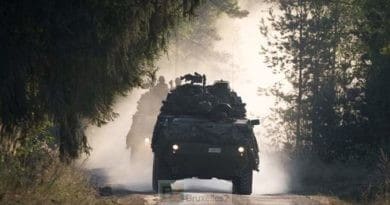Offers galore for Eumm Georgia
(B2) More than 300 personnel available. This is the figure we arrive at when we add up all the offers made - in writing or orally, to the Cops or to the Council - by the Member States for the
new EUMM Georgia mission. Such an avalanche of offers of contribution, so generous, may come as a surprise when we know the shortage suffered by certain Member States or certain current missions in reaching their manpower (Eulex in Kosovo at one time, Eupol Afghanistan or Minurcat in Chad today by example). “Everyone wants to participate. There was almost competition to see who sent the most men”, commented Finnish Foreign Minister Alexander Stubb.
Details of the first offers (according to the figures I was able to collect and which should still evolve):
86 French (a mobile gendarmerie squadron + 26 administrative staff)
40 Germans,
40 Italians (carabinieri)
30 Poles (10 police and 20 military)
30 to 40 Romanians
20 or 45 Britons (depending on sources, Milliband spoke of 10%)
27 Swedish
10 Belgians
10 Spaniards
10 Hungarians
15 Bulgarians (Ministry of Defense and Ministry of Interior)
10 Lithuanians
10 Czechs
20 Finns and Danes (joint contribution).
Offers to make. We will see, in a few days, if these advances are really materialized or if the staff. "Advertising is often quite easy. But then you have to be able to find the staff, ready to leave in the days that follow, for a few months" explains a European expert. Their profile must still meet the real needs of the mission or the head of mission. "I doubt that all the offers are really serious: how many French gendarmes and Italian carabinieri speak Russian, which seems a minimum in the region".
For the EUMM Georgia mission (as evidenced by the mandate of the Joint Action, adopted on September 15), it is not really a question of sending law enforcement forces, but more of people capable of ensuring the collection of information, their evaluation, and noting incidents - . Clearly, we need more investigators or intelligence agents than big guys, with shields and helmets. Even if the "deterrent" effect can be significant in a region where soldiers circulate (Russians, Georgians, Ossetian militias). Unless that is the desired effect. In this case, we will be closer to a "military" than a "civilian" mission.
The explanation of this avalanche. We can see three causes. First show in the eyes of his public opinion: show that we are there, present. This race for the biggest contribution (see the figures for France, Germany, Italy) also conceals a more internal challenge: obtaining the leadership of the mission. Finally, it should be noted that - for some countries - this offer covers - as Minister Kouchner pointed out - the three UN, OSCE and EU missions. Clearly, if we do not manage to increase the Osce workforce, we increase the EU workforce (the agreement with the Russians mention well "at least 200 observers"). Only problem: the budget of the mission is cut for 200 observers. It should therefore be increased in this case.
We can notice that the most daring for a sanction are not really the most "bullish" in their offer. Unless it's more realistic.
(NGV)

